Category: Freedom
Industrial Tailoring Students Provide Support for the Caste Equality Project
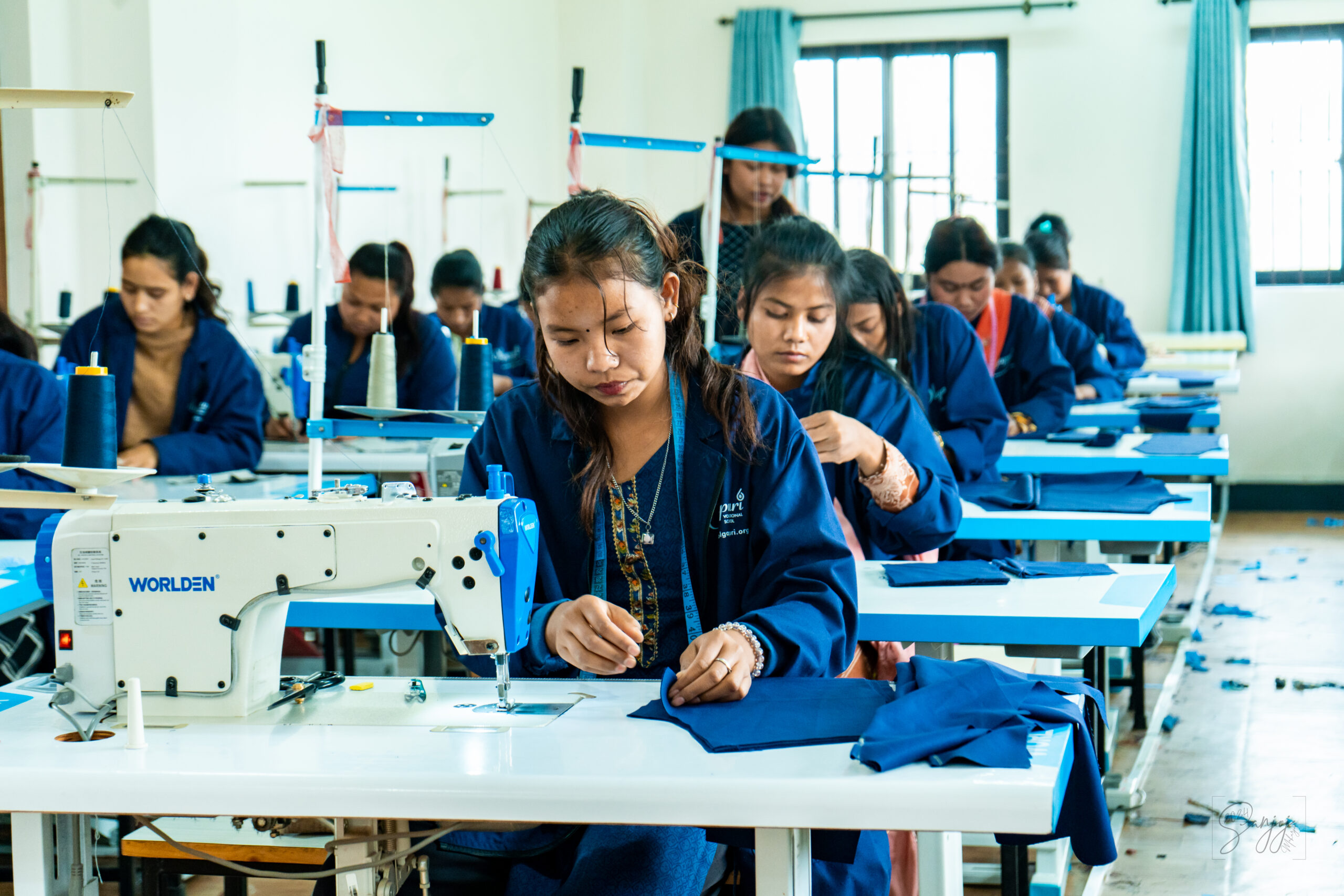
Former Kamlaris enrolled at Olgapuri Vocational School make school uniforms for massive back-to-school initiative!
Through the Caste Equality Project, NYF has spent the last few months working with local families, teachers, and stakeholders to organize a massive push towards educational equity in Saptari District.
Saptari District is a remote area of southeastern Nepal. Casteism, systemic neglect, and other generational challenges have left families unable to leverage their incredible potential to build prosperity. Boldly encouraging and championing the launch of the Caste Equality Project was among the last major projects of our late founder, Olga Murray’s lifetime, and she has trusted the NYF staff and community to share her promise and see this work through the end. Our goal is to empower Nepali Dalit communities to access the opportunities and resources they need to build towards the futures they envision for themselves and their children.
Our work in Saptari District will equip the community to be the primary agents within this important movement—exactly how Olga would have done it.
With the new school year in the district beginning at the end of April, we are stocking school kitchens with fresh, high-quality, nutrient-rich ingredients to combat widespread malnutrition and encourage school attendance. A huge part of this effort includes providing hundreds of children with school uniforms.
But these aren’t just any uniforms. They’re actually being crafted by NYF’s very own students currently enrolled in Olgapuri Vocational School’s Industrial Tailoring program. This program offers more than just hands on vocational training—but also an empowered path to a new life.
From Vision to Reality: The Industrial Tailoring Course
NYF’s Industrial Tailoring course at Olgapuri Vocational School represents a story of a worthwhile transformation from one collective vision. The idea originated from a women’s empowerment group within the Freed Kamlaris Development Forum (FKDF). FKDF is a community-based nonprofit led by and developed specifically for former kamlaris—young Tharu women who were once trapped in a system of indentured servitude in the homes of Nepal’s elite. (You can read more about NYF’s 20-year-long project freeing kamlari girls and abolishing the practice here!)
During a group discussion, these women saw the need for professional training in industrial tailoring. They recognized the potential for a stable, flexible, and lucrative career in Nepal’s booming clothing export industry. Their request was so powerful and enthusiastic that our team had to find a way to provide this opportunity. In May 2021, we welcomed our first class of students in the new Industrial Tailoring class.
Industrial Tailoring quickly became Olgapuri Vocational School’s most popular courses for women. It’s not just about learning a valuable trade; it’s about creating opportunities, building empowerment, and reclaiming futures. These special training courses support these women in their journeys to advocate for a better future for themselves, their families, and their communities.
Industrial Tailoring and the Pursuit of Caste Equality Today
In 2024, NYF’s Industrial Tailoring course continues to be a very popular option for women, including many former kamlaris.
We’re thrilled to share that the talented students currently enrolled in the course are supporting NYF’s efforts to advance educational equity in Saptari District by helping to create the much-needed school uniforms! Students are practicing their new skills by lovingly preparing structured shirts, jackets, skirts, slacks, and neckties for boys and girls in a variety of sizes—all while receiving an additional income!
Graduates of the Industrial Tailoring program have been supporting the process by fine-tuning the final products created by their peers. These graduates are earning a higher rate than they would at the factories they work for! The assignment is perfect for refining important tailoring skills that they’ll need in their new careers, while also earning a living wage through this special project. They’re creating a total of 670 sets of uniforms for the children in Saptari District to wear on the first day of school.
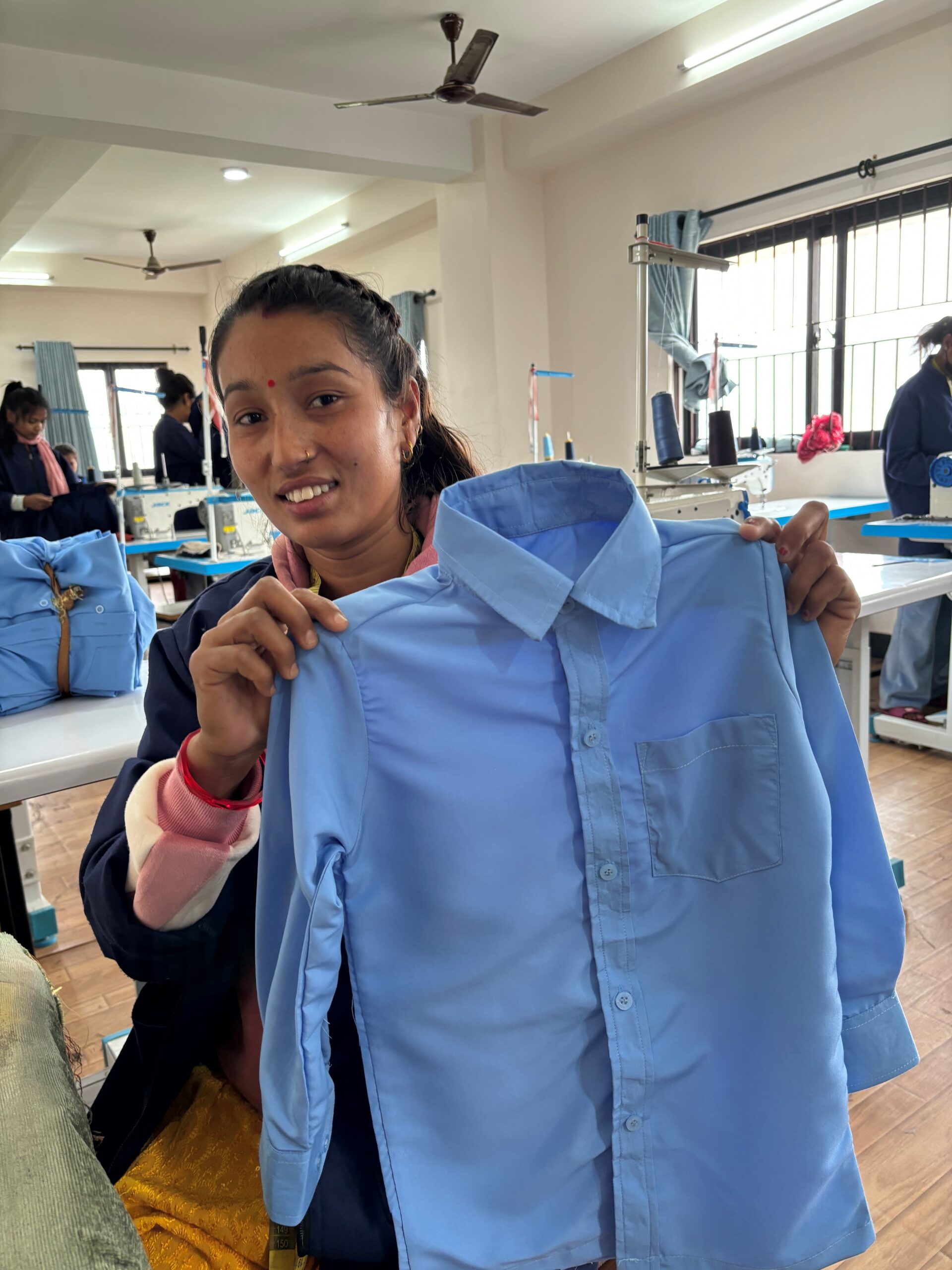
A Transformative Change in Saptari District
The timing of this educational push through the Caste Equality Project lined up perfectly with the industrial tailoring course. It has created a unique and lucrative opportunity for former kamlaris to support in creating these long-lasting school uniforms. We’re delighted that these women—who were once robbed of educational opportunities and their childhoods—are now empowered leaders who can support and transform communities in Nepal through projects like this.
As NYF continues to grow, our team molds and develops programs in the contexts of local need, potential, and participation. We strive to ensure our interventions in Nepali communities are done through sustainable measures that emphasize self-sufficiency whenever possible. What a golden example!
Join us in celebrating these resilient women who are leading the way to a better tomorrow. You too can support the Caste Equality Project and this educational push by making a donation today.
Meet the Saptari District Moms helping to launch the Caste Equality Project
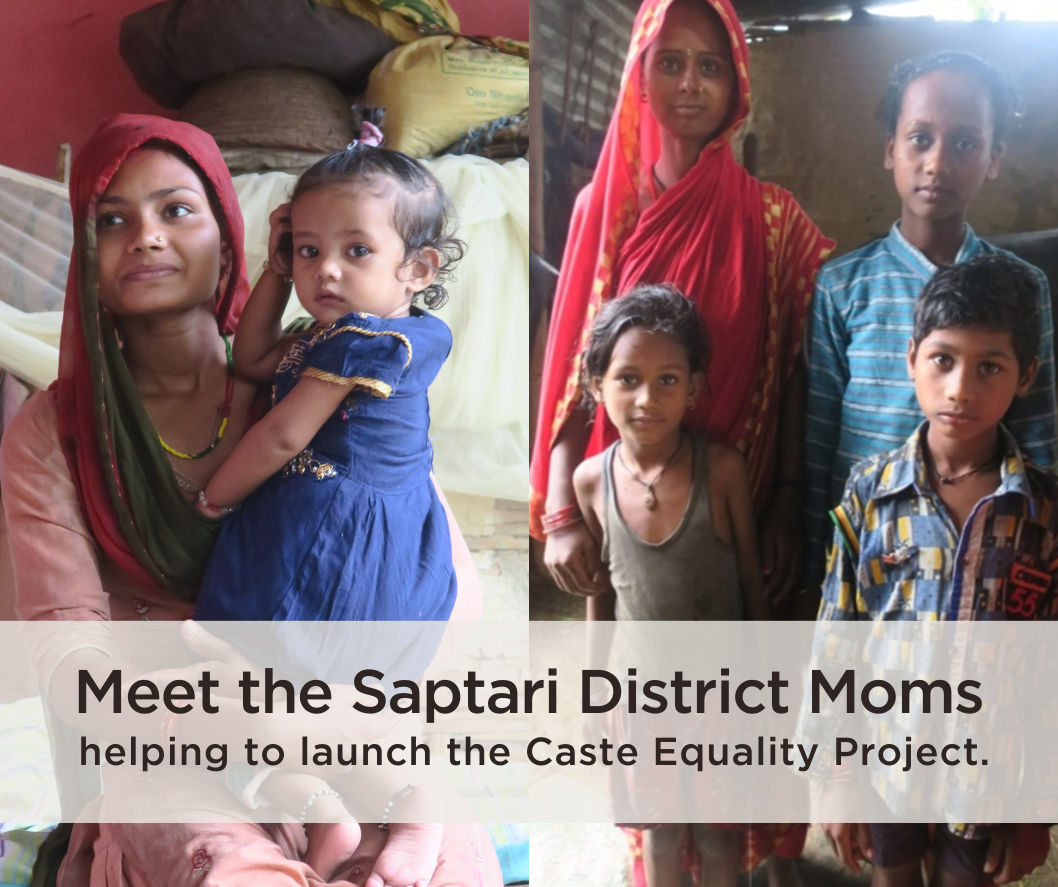
In April 2023, Radhika* (29) joined thousands of families who brought children to a Nutrition Outreach Camp in Saptari District. Her children, Kamala* (13), Dinesh* (10), and Sharmila* (7) had never seen a doctor.
Radhika was anxious at first. Members of Dalit castes, historically labeled as “untouchable” across South Asia, still face tremendous systemic discrimination, exploitation, and societal exclusion. Would they be turned away, or ignored, or even threatened or beaten?
She was relieved when the NYF team told her their organization wanted to help as many Dalit families as possible.
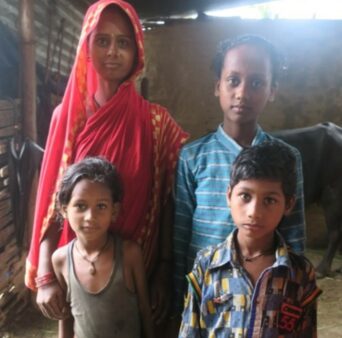
Clockwise from top left: Radhika, Kamala, Dinesh, and Sharmila welcome the NRH fieldwork team into their home for a follow-up visit in Sept. 2023.
While the NRH visit significantly improved their nutritional status, systemic challenges related to caste identity have made that progress difficult to maintain back home.
NYF is helping them and other moms in Saptari District overcome these challenges and achieve lasting health. Meanwhile, their feedback is helping us ensure that the Caste Equality Project is as successful as possible.
Then the pediatrician told Radhika that all three kids were malnourished—Dinesh and Sharmila severely so. She felt a jolt of helplessness, and even shame. But NYF’s team immediately invited the whole family to the Kathmandu Nutritional Rehabilitation Home (NRH) for treatment. Radhika was stunned that the three-week stay would be free-of-charge.
At the NRH, Radhika’s kids quickly gained weight and became healthier. And Radhika mastered the nutrition lessons, even encouraging her kids to participate. At discharge, the family was cautiously optimistic about applying everything they’d learned and continuing their progress.
But when the NRH fieldwork team followed up in September 2023, Radhika had run into significant challenges. Dinesh and Sharmila had started growth spurts. Even though they hadn’t lost weight, they were both technically malnourished again. Once more, Radhika felt guilt and overwhelm. But the NYF team reassured her. Her story highlights unique problems facing the Dalit community. Understanding her challenges is helping NYF create solutions.
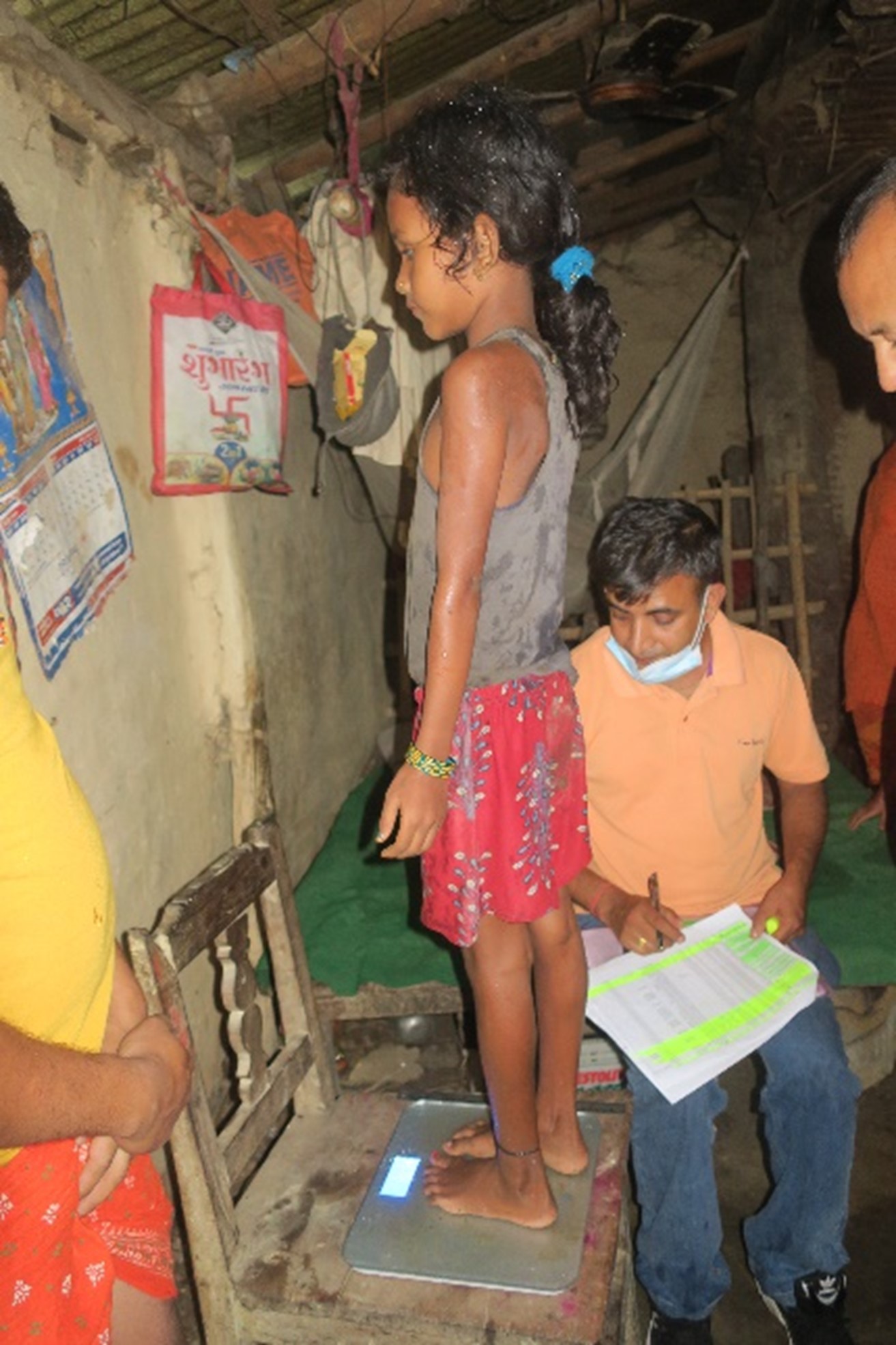
Six months after Sharmila left the NRH, NYF’s Field Supervisor, Ramesh Pant, weighs her to check progress. The family & field team worked together to create a dry, level surface to do so.
Caste discrimination prevents many Dalit families from building sturdy, permanent homes. As our Educating Dalit Lawyers scholars gain experience, they will help families navigate the legal hurdles standing between them & safe, dignified living spaces.
In the meantime, our team is honored to be invited inside these homes. This simple respect helps strengthen the message that no one is untouchable.
Photo credit: Naresh Tuladhar
| Learning from Radhika | Project Solutions |
|---|
| Improved nutrition kicks off important growth spurts. While Radhika is using all the best techniques she learned at the NRH, her growing kids need more food to sustain healthy development than she can afford. | ➤ | Creating a nutrient-rich school lunch program ensures growing kids eat at least one well-rounded meal per day, lowering the financial burden for parents right away. |
| Radhika had children very young without access to family planning knowledge. Feeding multiple “big kids” is more difficult than feeding individual “little kids.” | ➤ | An awareness campaign on child marriage & the dangers of early, rapid childbearing will empower women to marry later & control family size. |
| Radhika makes ends meet by selling milk from their family cow. Ideally, the kids would drink this milk, but they cannot afford to lose this income. | ➤ | Income-generating trainings & small business start-up funds for parents will help them afford the ingredients for a balanced diet. |
| Radhika’s husband is a migrant laborer overseas. She and her children rarely see him. He sends as much money home as he can, but the whole family still relies on daily wages from labor done on local farms. | ➤ | Vocational trainings for young adults provide lucrative alternatives to migrant labor, keep families together, and help parents make enough money to keep their kids in school. |
| Radhika’s family has been denied citizenship rights due to a lack of formal records, so she can’t buy or lease land for a garden. The nearest market with fresh produce is too far away and too expensive. | ➤ | NYF is exploring options to lease land near villages for large community gardens where local women can grow produce for their families and sell excess to their neighbors! |
| Because she can’t own land, Radhika’s house isn’t permanent. Clean water & hygienic facilities are limited. Even when care is taken, water contamination leads to illness, causing rapid nutrient loss. Malnourished children are especially vulnerable to infection. | ➤ | Improving community access to clean water will involve installing plumbing in central areas, raising awareness about water purification & creating a local water management team. |
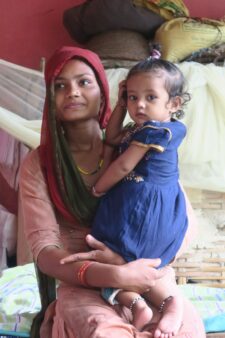
Bina* is one of the best-educated people in her village: she completed grade 10 with excellent scores. She brought her sweet one-year-old daughter Padma* to the same camp Radhika’s family attended. Padma was severely malnourished and needed urgent care at the Kathmandu Valley NRH.
While at the NRH, Bina was surprised to learn how cooking methods impact the nutritional value of food. She felt dismayed that in all her efforts in school, no one had ever taught her any of the nutritional information that would have helped her nourish her baby. Now she knew her usual cooking methods often wasted crucial nutrients. She had even been cutting away and discarding the most nutritious bits!
At follow-up in Sept. 2023 (at left), Bina shared that she is applying her updated knowledge every day. Padma’s health is better than ever. Bina’s health is better, too. Vegetables are hard to access in Bina’s village—she has to walk an hour to get to the market. But Padma’s health is worth the trip. Bina has wrapped this errand into her regular routine, and she’s sharing tips with her neighbors, too!
The Caste Equality Project is NYF’s most ambitious initiative yet. We’re vowing to empower Nepal’s Dalit communities
—starting right here in Saptari District.
Saptari District Moms like Radhika are helping shape this project!
Nepal Youth Foundation launches Phase II of Caste Equality Project!
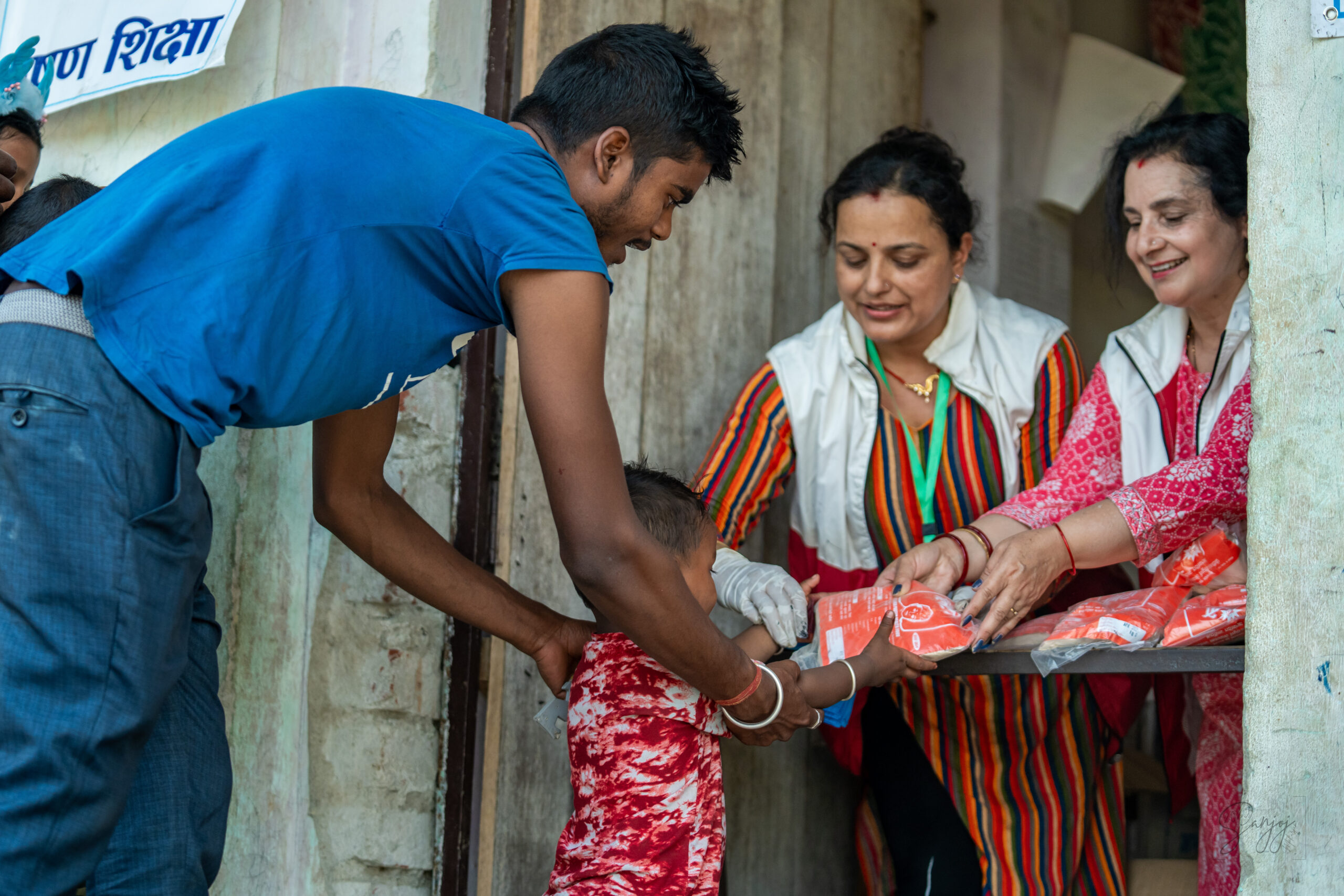
We are beyond excited to share that earlier this month, NYF officially launched Phase II of the Caste Equality Project (CEP) in Saptari District! (For more information and updates about Phase 1: Educating Dalit Lawyers, click here.)
Saptari District is a region of Nepal where Dalit populations (those historically called “untouchable”) face particularly complex barriers between themselves and crucial resources like education, good nutrition, safe shelter, and more. NYF is finally beginning the work of turning the tide for children living in Saptari District, bringing 30+ years of expertise—and the promise of longevity!
Watch our launch video on YouTube:
Phase II will bring specialized versions of our existing, proven programming into the Musahar Dalit villages of Saptari District. We’ll also be working with 2-3 villages first before gradually expanding to reach more. Over a generation (or more!), NYF will work to empower these communities to break cycles of inequity and foster community-led growth and achievement—just like we did with the Tharu communities in western Nepal between 2000-2020†.
† In early 2000, NYF learned of the practice of kamlari bondage, in which young girls from the Tharu ethnic minority were being sold into kitchen slavery by their fathers. This was happening due to systemic oppression of their communities, including patterns of predatory lending, which were making this practice necessary for family survival. During the next 20 years, NYF embedded a team in the regions impacted by this practice, intervening on behalf of the girls and providing the community supports needed to obliterate the practice legally, in actual fact, and even on the level of community acceptance. Click here to learn more about this remarkable success.
Between the summers of 2023-2024, NYF has plans in Saptari to:
- Drastically improve the daily midday meal in schools, using learnings from our Community Nutrition Kitchens during our earthquake response and our COVID-19 response. The meal will meet each growing child’s core nutritional needs. This will improve school attendance and will improve the nutritional status of the children themselves.
- Organize town meetings to help teachers, local government officials, and parents create a joint, cooperative strategy where K-12 education is concerned.
- Establish a safe “study hall” environment as a space for preschoolers (all day) and older children (after school) to receive educational support, allowing parents to focus more on working without worrying about childcare.
- Provide vocational training for 20 young adults in construction trades like plumbing, electrical, welding, and carpentry. These young adults will then return to their villages to begin their first trade jobs: improving the school buildings back home!
- Bring school infrastructure to usable standards, including bathroom improvements, safety, and more.
- Establish a local co-op/savings group among the women, beginning by providing livelihood training and business start-up support to 20 mothers.
- Begin establishing a peer counseling program.
- Launch a large-scale awareness and prevention campaign about topics related to women’s health: menstrual hygiene, early marriage, nutritional health, and the traditional dowry system, for example.
- Hold adult literacy classes.
- Organize disaster preparedness programs and establish emergency response resources within the villages themselves, including forming an action group for disaster response, plus environmental protection and hygiene (for example, protecting water safety).
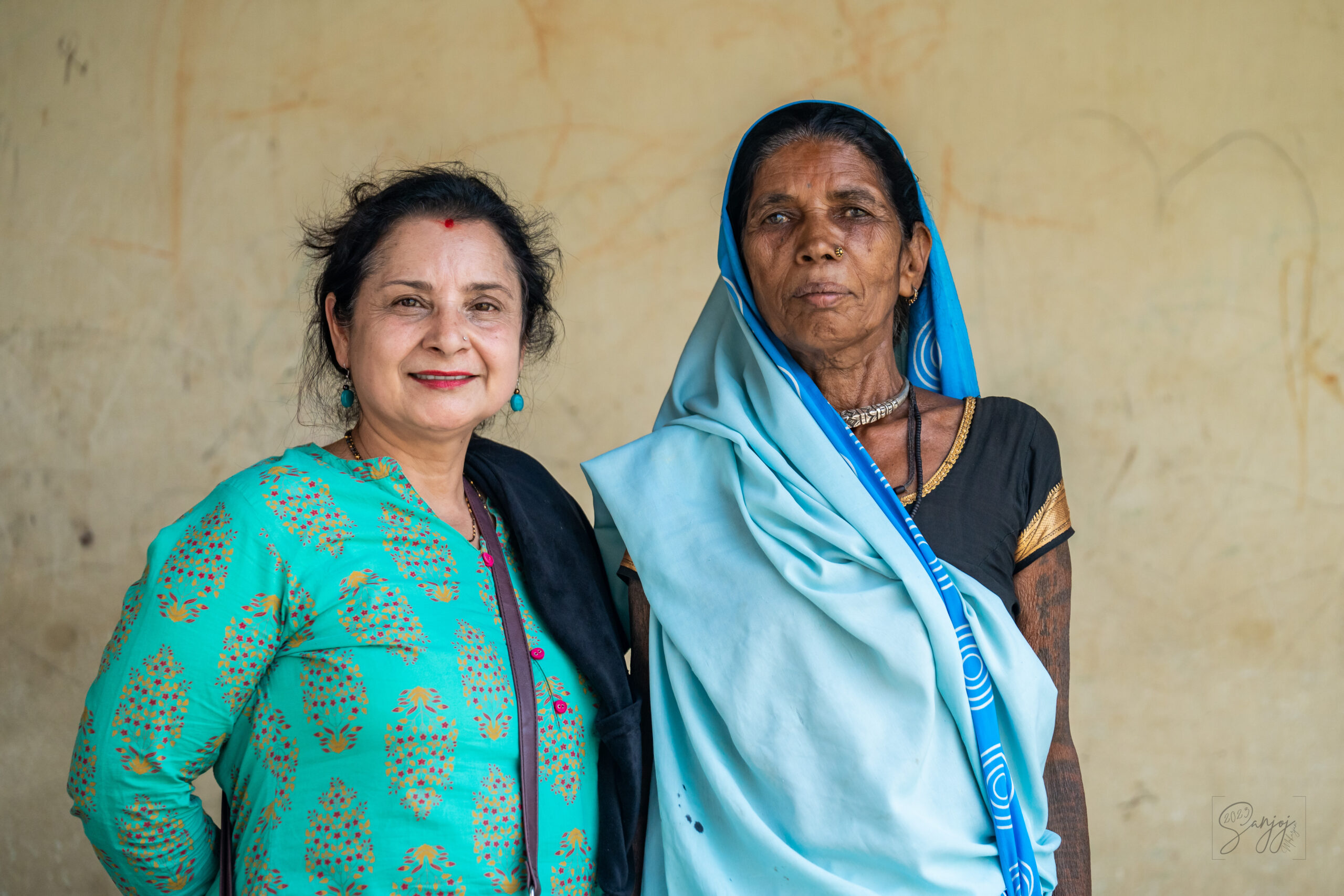
Pictured above: Sunita Rimal, NYF’s Nutrition Coordinator, with a community health worker in Saptari District during a nutrition outreach camp earlier in 2023.
How you can help:
Our team on the ground in Saptari District will pay strict attention to the successes and pain points of each of these programs, always ready to adjust where needed. But for our programs to have lasting, sustainable effect, NYF needs strong support from friends who know the power of healthcare and education in the lives of children, families, and communities!
Celebrating 10 years of the end of Kamlari!
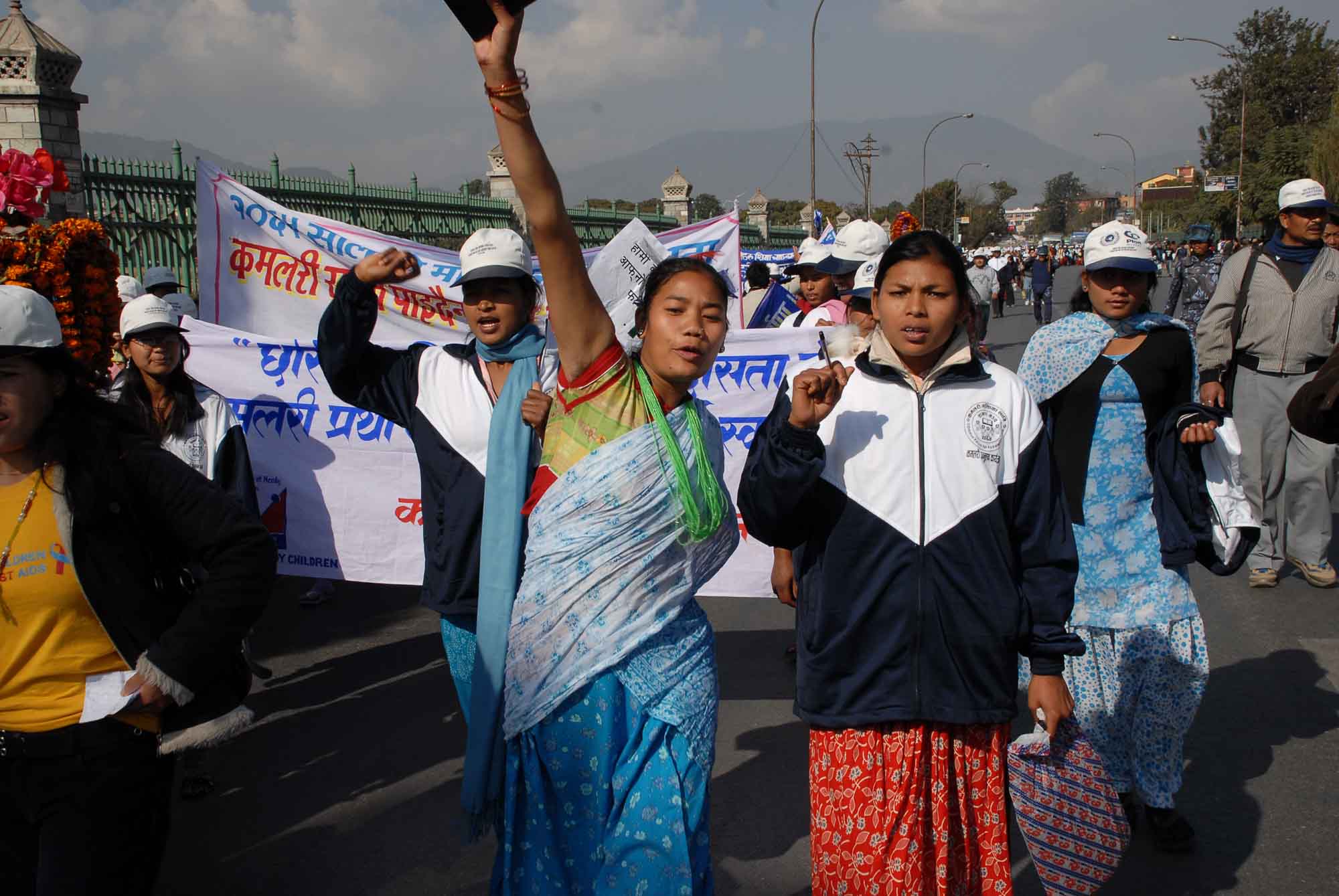
On June 27, 2013, Nepal’s legislature officially abolished the kamlari practice: a system in which members of the Tharu ethnic minority in Western Nepal sold their daughters (some as young as five years old) into indentured servitude in the homes of Nepal’s elite. The practice, built on a foundation of predatory lending, ethnic oppression, and generational debt, robbed tens of thousands of young women of educational opportunities, cultural connection, and their childhood.
NYF successfully eradicated the practice in Nepal. We empowered young Tharu women to advocate for themselves, improve the lives of their families, and support a better future for their communities.
We concluded the program in 2020, but our partnership with the Freed Kamlari Development Forum (a local nonprofit, led by former kamlaris, that NYF helped to build) continues to this day.
It’s been 10 years since the legal abolishment of Kamlari indentured servitude, so we wanted to observe the anniversary of this incredible accomplishment by taking a quick look back…
Check out recent stories highlighting freed Kamlari women:
- September 18, 2019: Freed Kamlari Development Forum (FKDF) inaugurates new headquarters!
- September 11, 2020: Tharu Leaders Transforming their Communities in Nepal
- September 15, 2020: Former Kamlari women supports communities during COVID-19
- January 14, 2021: Highlights from an external study on the impact of our 20-year efforts to empower young women impacted by the kamlari practice.
- March 5, 2021: Bishnu Chaudhary passes bar exam, becoming first Freed Kamlari lawyer
- June 24, 2021: Lila Tharu, former Kamlari, is a frontline warrior, saving lives during COVID-19
- January 19, 2023: Former Kamlaris Propose Industrial Tailoring Course
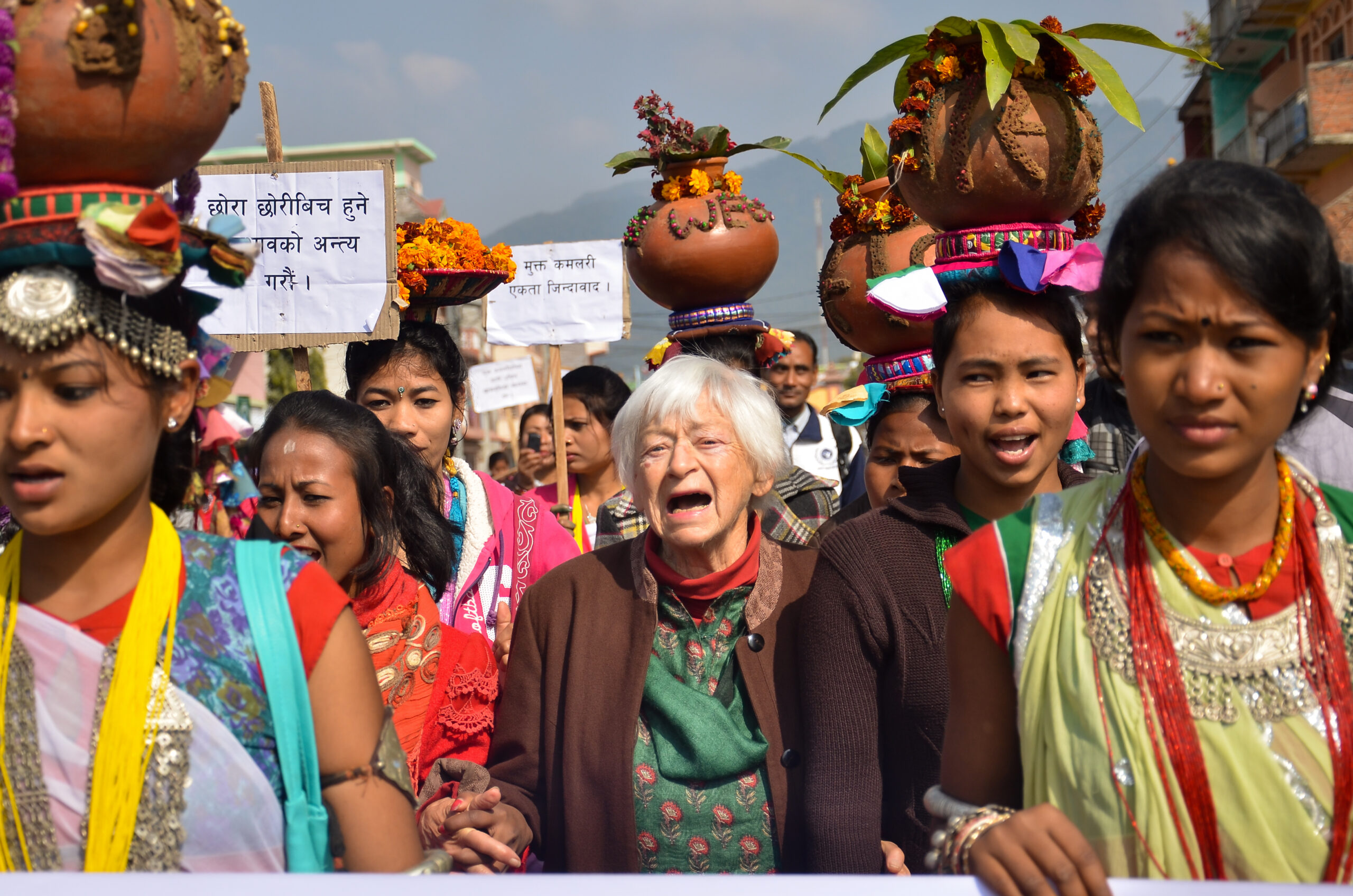
Looking Ahead
Only 23 years ago, our team was just arriving in the Western Terai to learn about the kamlari system and its place in Tharu society. The practice was so entrenched, and so accepted, within these communities that it was difficult to imagine the work it would take to eradicate the system entirely. We started by freeing a handful of girls, and charged forward from there.
Thirteen years later, in June 2013, Nepal’s government formally abolished the practice, and added annual funding to the country’s budget that would provide scholarships and support to the women and girls whose childhoods had been impacted. NYF’s tireless, creative work within the Tharu communities had rapidly taken the kamlari system from an accepted, expected, open-air practice to one seen as exploitative and unacceptable by everyone in the villages.
Now, 10 years after the kamlari practice was abolished, NYF is tackling another massive, entrenched social issue: Nepal’s caste system. Using our success in the Western Terai as a guide, our Caste Equality Project will work within Dalit (formerly known as “untouchable”) communities to empower children and families to dismantle the oppressive systems around them.
We hope you will join us.
Educating Dalit Lawyers Update: Students have started school!

Thank you to everyone in the NYF Community for generously supporting the launch of Phase 1 of the Caste Equality Project—Educating Dalit Lawyers!
We are proud to announce that our first group of 15 Educating Dalit Lawyers (EDL) scholarship recipients started classes on Monday, February 27th, 2023.
About the Students & the Law Schools
Our EDL students are attending the top three law campuses in Nepal, each affiliated with Tribhuvan University. Specifically, five students are attending Nepal Law Campus in Kathmandu (the best, most competitive law school in Nepal). Five are attending National Law College in Kathmandu, and five are attending Prithvi Narayan Campus in Pokhara. These colleges offer excellent human rights law courses.
This year, a total of 1,152 prospective law students earned a passing score on the rigorous entrance exam. The Tribuhuvan University-affiliated law campuses only offer 280 seats per year, which go to the highest scorers. Our students have worked tremendously hard for their places in law school. We are honored to be supporting their goals of providing much-needed legal services to their communities!
Student Profiles
Two of our students are from the Madhesi subcaste (often identified as the most oppressed of the Dalits), with three other subcastes also represented. We have students from all seven of Nepal’s provinces: Lumbini (5), Madhesh (3), Bagmati (1), Sudurpashchim (2), Province-1 (1), Gandaki (2), & Karnali (1).
Nine of the students are brand new law students, and six had already begun law school before we began offering our scholarship. Of these six, two are in their second semester, three are in their third semester, and one is in his fifth semester.
Ten of our students are men and five are women. This was a surprising outcome, because two-thirds of our original group were women. The nuanced challenges facing Dalit women is just one of the areas we are determined to understand better in the coming years.
Ravi*
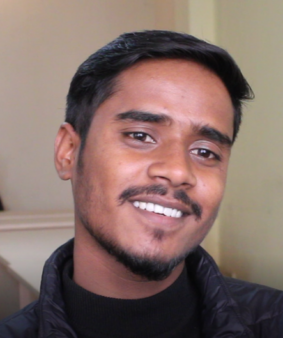
Ravi comes from Nepal’s eastern plains region, where Dalit families often have limited job opportunities due to illegal untouchability practices. Growing up, he witnessed tremendous injustices towards Dalit people within his own village, including accusations of witchcraft and humiliating public punishments.
After his brother married a young woman from a higher-caste family, their home original village expelled Ravi’s family. The woman’s relatives filed a legal case accusing Ravi’s brother of human trafficking. Their family went into debt combatting this unjust charge, and Ravi became keenly aware of how little access they had to legal support. Having no one to turn to for guidance during this time was terrifying for the entire family.
Now Ravi hopes to become a public prosecutor focused on safeguarding the rights and interests of the Dalit community.
He is thrilled to be receiving the Educating Dalit Lawyers scholarship and living in a shared EDL apartment near campus. “Living together with other friends from this group is fun, and it has also helped me in my studies. We discuss various issues and topics, which enhances our understanding and clarity,” says Ravi.
Sushma*
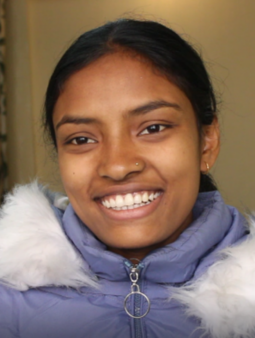
Sushma grew up facing the especially unjust treatment Dalit women experience every day. Her childhood was full of horrifying instances of violence against women and girls from her community. This unfortunately includes personal experiences which she has only just begun to share with anyone.
This mistreatment by all parts of society caused Sushma to doubt her own worth. She grew up feeling isolated and never truly safe.
In school, Sushma learned about Nepal’s constitutional provisions regarding the rights of Dalits and women. But she knew first-hand that violations were being suffered every day. She hopes to specialize in criminal law, ensuring these rights are honored by Nepal’s legal system and making society safer for future generations.
Being surrounded by other EDL scholars has already given Sushma a new sense of safety and purpose. When Sushma put on her formal uniform for the first day of college, she says, “I felt an amazing sense of accomplishment, as if I had already become a lawyer. This opportunity is extremely valuable and I want to utilize this to do my best.”
*Names changed to protect the privacy of our students.
Next Steps
Our scholarship team is working with Dignity Initiative to refine our application and selection process for the next group. We expect to be launching our next call for applications in our Educating Dalit Lawyers program in June 2023!
We are also preparing to launch K-12 educational programs in the Dalit communities living in eastern Nepal’s Saptari District—the groups of Dalits facing some of the worst multifaceted, complex forms of discrimination, including massive educational neglect.
Our team is exited to share more about these new programs in the coming months.
Dhanyabad!
Industrial Tailoring at Olgapuri Vocational School
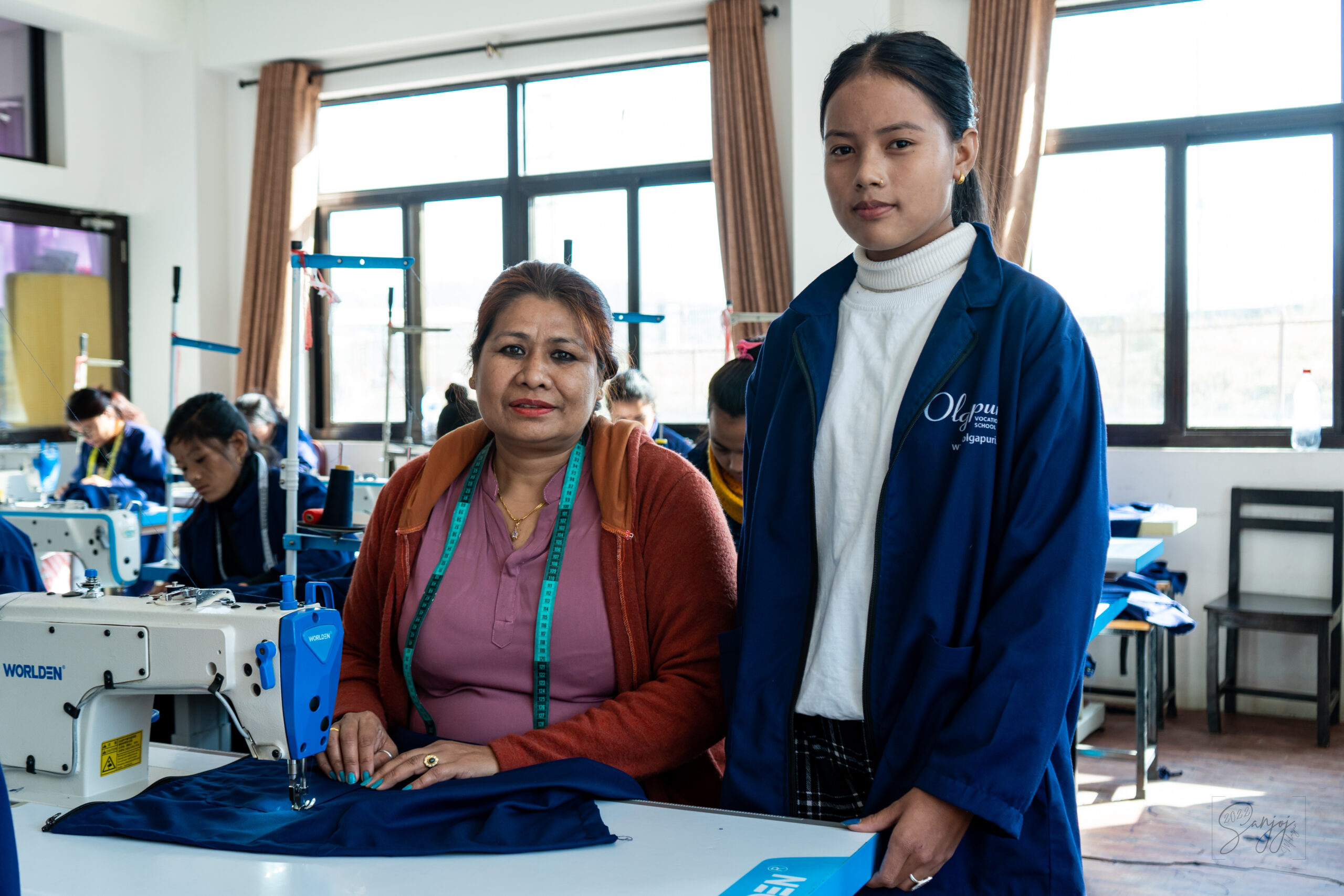
Industrial Tailoring has quickly become one of Olgapuri Vocational School’s most popular courses for women. The average monthly wage for our graduates is 30,000 rupees per month ($260), with room to grow. Those with more experience are making as much as 45,000 rupees ($390)—over three times Nepal’s minimum wage!
Over the past year, our team has had conversations with uneasy supporters about our new Industrial Tailoring vocational training course, which is held exclusively for women.
We’re hearing two main concerns:
- “Sewing is traditionally undervalued as ‘women’s work’. Shouldn’t we be trying to encourage young women to break free of these sorts of industries, rather than continuing this pattern?”
- “Isn’t the garment / textile industry particularly dangerous and exploitative? I don’t want my donations to go towards placing these bright young women into sweatshops!”
Maybe you’ve had similar concerns! In fact, people on the global team and on the board have discussed these same worries. At NYF, we deeply appreciate how thoughtful our supporters are, and how engaged you are in looking out for the children and youth we serve.
Our Commitment to Women’s Empowerment
First and foremost, our global team is committed to empowering women to follow their dreams. This is especially the case when their options are limited because of entrenched gender roles and hierarchies. We believe every girl and every woman should be free and safe to choose her own destiny!
We’re also appalled by the conditions within many of the world’s factories—not just garment factories. No one on our team wants to see any one of our beneficiaries trapped in an oppressive, unsafe working environment.
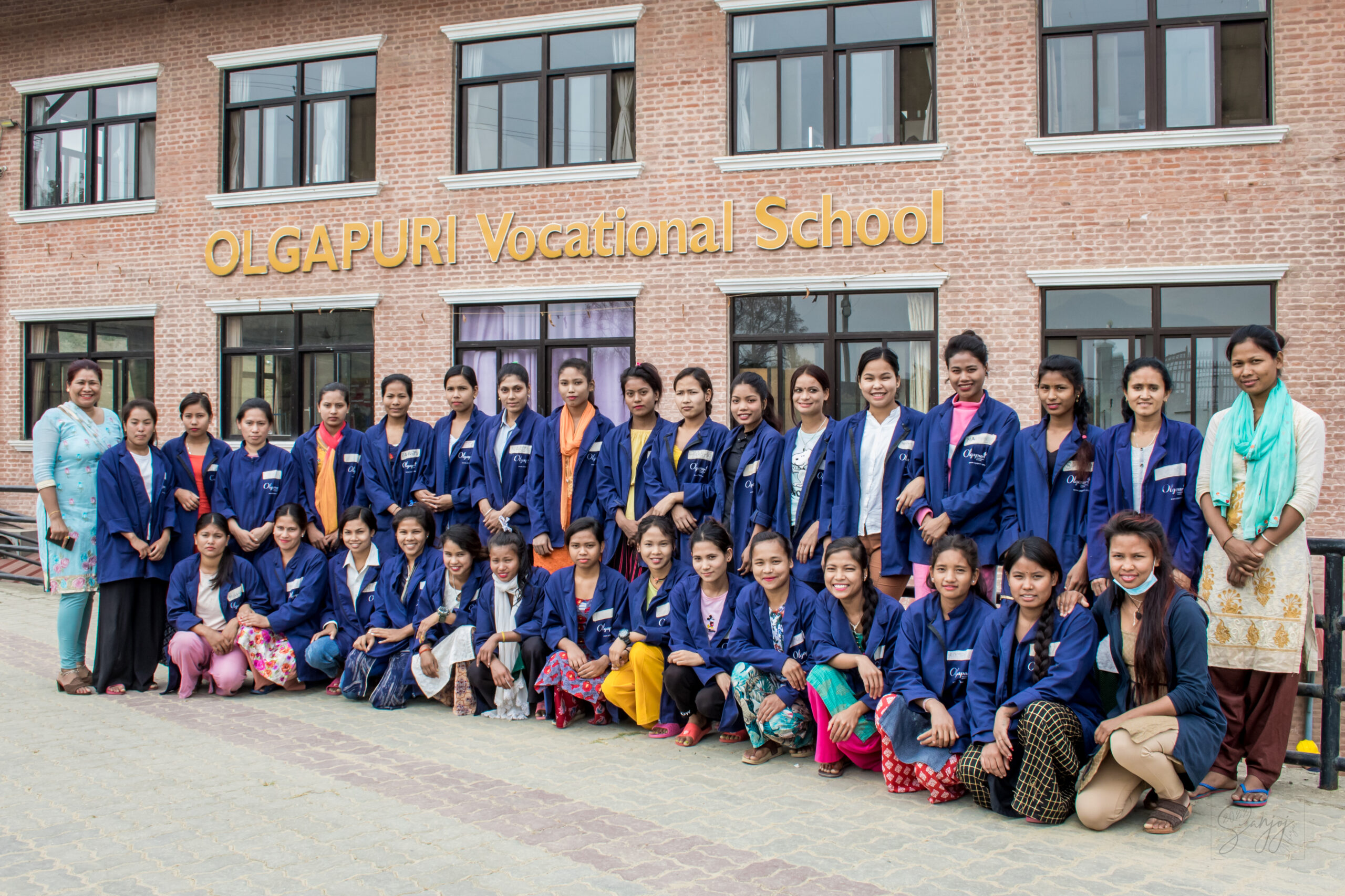
All Olgapuri Vocational School courses are openly advertised as available for all genders. At the orientation presentations where young people are given application options, women are always strongly encouraged to apply. Some of the instructors for these courses are women, giving potential students clear evidence that women are welcome.
However, despite all this, NYF has struggled to interest young women in signing up for these opportunities. As a result, enrollment in these programs is overwhelmingly male (a staggering 90%).
Our team has been working for several years to understand this phenomenon and to provide good solutions. Young women know they are welcome to apply for these courses in male-dominated career fields.
But many of these young women still don’t feel safe in those industries.
NYF can place female construction graduates in positions where we know they will be hired, paid equitably, and respected by their employers. Unfortunately, we can’t guarantee that they will not experience sexual harassment and other sexist aggression in the workplace.
Many young women don’t want to walk that challenging path, even if it pays more. They just want to make a decent living, gaining personal economic freedom without entering a career where conditions simply won’t feel safe for them as women. We can’t fault them for that.
Former Kamlaris Propose Industrial Tailoring Course
Olgapuri Vocational School’s Industrial Tailoring course was proposed by a group of former kamlaris. This initial group of young women met one another in a women’s empowerment group run by the Former Kamlaris Development Forum (FKDF). (The FKDF is a community-based nonprofit NYF helped found in the Tharu communities impacted by the traditional kamlari practice.)
In a group discussion, several of these women shared that they wished NYF offered a course in Industrial Tailoring. It seemed strange to them that this course wasn’t available. After all, they reasoned: clothing is one of Nepal’s biggest exports, and the job market in this area is growing. Careers in this field are stable, well-paying, and have room for growth and flexibility.
Even knowing that women were encouraged to apply for the construction training programs, some of these women almost felt left out by OVS because we weren’t offering trainings in the career fields most likely to attract female engagement.
The freedom to choose among a set of only male-dominated options just didn’t feel like real freedom.
Fortunately, these empowered young women knew they could ask NYF directly about such an option. They also had a growing group of women behind them who all agreed they’d leap at the chance to earn their certifications in Industrial Tailoring.
When this group approached NYF, our team let them know the common concerns about workplace dangers in the garment industry. The young women responded that construction trades are also dangerous. They all knew someone who had experienced an electrical accident or been injured by a power tool. And as far as exploitation was concerned, these young women had already survived kamlari bondage. They know better than most that bad actors exist in all industries.
Thanks to NYF and the FKDF, though, they also possess the extraordinary inner tools that empower them to defend themselves from exploitation—and motivate them to defend their sisters as well.
Their request was so powerful and enthusiastic that our team had to find a way to provide this opportunity.
The Curriculum
NYF’s team made connections with local high-quality garment factories known for their fair practices and safe working conditions. They asked for their guidance in creating an ideal classroom and for help developing a specialized curriculum. These experts shared a list of skills all their employees needed to master, as well as a list of “dream skills” that made tailors especially competitive in the workforce.
Being highly skilled in a trade is a major safeguard against exploitation in any industry. This is because it allows workers the flexibility to seek out better workplaces without risking financial ruin.
Our team designed a six-month course which would prepare trainees to create high-quality garments for local consumption as well as for international export. Importantly, the training also includes the information needed for a student to establish her own small clothing business.
The curriculum covers industrial machine operation and maintenance, different kinds of stitches and their uses, measurement skills, fabric types and their uses, clothing design principles, and how to take items from printed designs to fabric cutting to assembly and through to the finishing touches. Safety is always an important topic as well.
Trainees are given specialized life skills and group therapy sessions (and, where needed, personal therapy as well) through NYF’s Ankur Counseling Center.
They also participate in motivational sessions on women’s empowerment!
During the entire six-month course, trainees live in the Olgapuri Girls’ Hostel. This is a space created especially for young women in vocational training courses (many of whom are not familiar with city life) so they can feel safe and secure during their training.
The first four months of the training consist of classroom instruction, followed by two months of paid On-the-Job training in one of the city’s high-quality factories. This is a paid apprenticeship period, with pay being nearly double Nepal’s minimum wage.
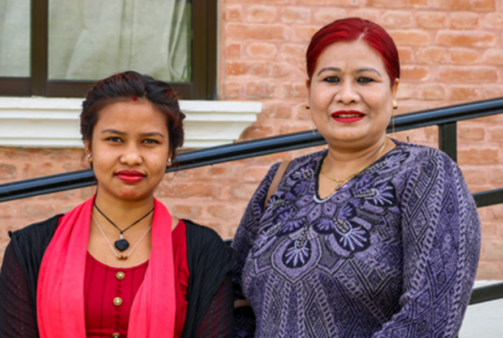
Meena Kumari Chaudhary (left, Asst. Trainer) is a former kamlari—and she was also one of the earliest graduates of our Industrial Training program! She’s thrilled to be using the skills she learned here to empower more women to enter this growth industry.
Here, she is pictured with Lead Trainer Anju Thapa. Both women have become role models for the young women hoping to build a sustainable career in tailoring!
Workplace Safety
Unfortunately, sweatshops do exist in Nepal. These cramped factories regularly ignore laws and regulations, have extremely poor and unsafe working conditions, and have unscrupulous bosses who demand inhumane working hours and withhold pay. NYF would never partner with these organizations, let alone intentionally place a trainee in such a working environment.
Kathmandu is also home to factories where workers are treated fairly, paid well, and conduct their work in well-lit, airy spaces that are kept tidy, with wide paths for evacuating in an emergency, ensuring safety for everyone. These are the workplaces our graduates enter, as a group of empowered women determined to build their futures—and continue working towards a more equitable world.
Bindu’s Story
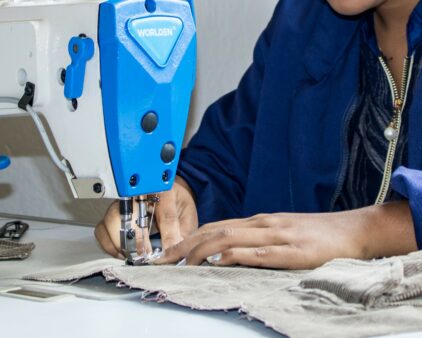
Bindu* has survived horrific ordeals over the past two years. During the COVID pandemic, she started dating an older man, against her parents’ wishes. Soon, this man convinced her to run away with him to start a new life in India. Dreaming of a beautiful future, Bindu followed him across the border. Bindu quickly learned that the man’s intention all along had been to traffic her.
Betrayed and heartbroken, Bindu relied on her inner strength to survive her situation—and she somehow managed to escape her captor and return to Nepal.
But the nightmare wasn’t over. When Bindu finally reached her home village, her parents rejected and disowned her.
Fortunately, Bindu found an organization working with women who have survived sex trafficking, and they helped her file a case against the man who trafficked her. Thanks to Bindu’s courage, he’s now in prison, where he can’t hurt any more girls and women.
Bindu found housing in a women’s shelter in Kathmandu as she prepared for her next steps. One of the staff members there heard about NYF’s new Industrial Tailoring program—and immediately thought of Bindu.
Bindu has taken to the Industrial Tailoring skillset extraordinarily well. For the first time since she ran away from home with a heart full of hope, Bindu feels like her dreams are truly within reach.
“I never thought I’d be able to acquire a skill that would pay me this much,” she says, adding, “Economic independence is very important to me, as I have no family to support me. The work environment is also safe and pleasant. The other girls and women that I work with have become like my family—and my greatest support system. I feel very fortunate to have had the opportunity to meet them and work with them.”
A long waiting list…
In the first year of its existence, the Industrial Tailoring course quickly became one of OVS’s most sought-after options. Our team has already trained 149 women—and there’s a long waiting list. Most of these women are former kamlaris from western Nepal, but we’ve also received numerous referrals from Kathmandu women’s shelters and other aid organizations. This training has already empowered single mothers, survivors of domestic violence and sexual abuse, and women who have escaped trafficking.
We are so grateful for the support that allows us to offer these women this remarkable opportunity. We hope to be able to continue offering it as long as young women are interested.
The Empowering Freed Kamlaris program is one of NYF’s greatest achievements. For more information on the former kamlaris and the FKDF, please visit https://nyf.news/efk
International Youth Day 2021: SAAET Stories from Early Project Graduates!
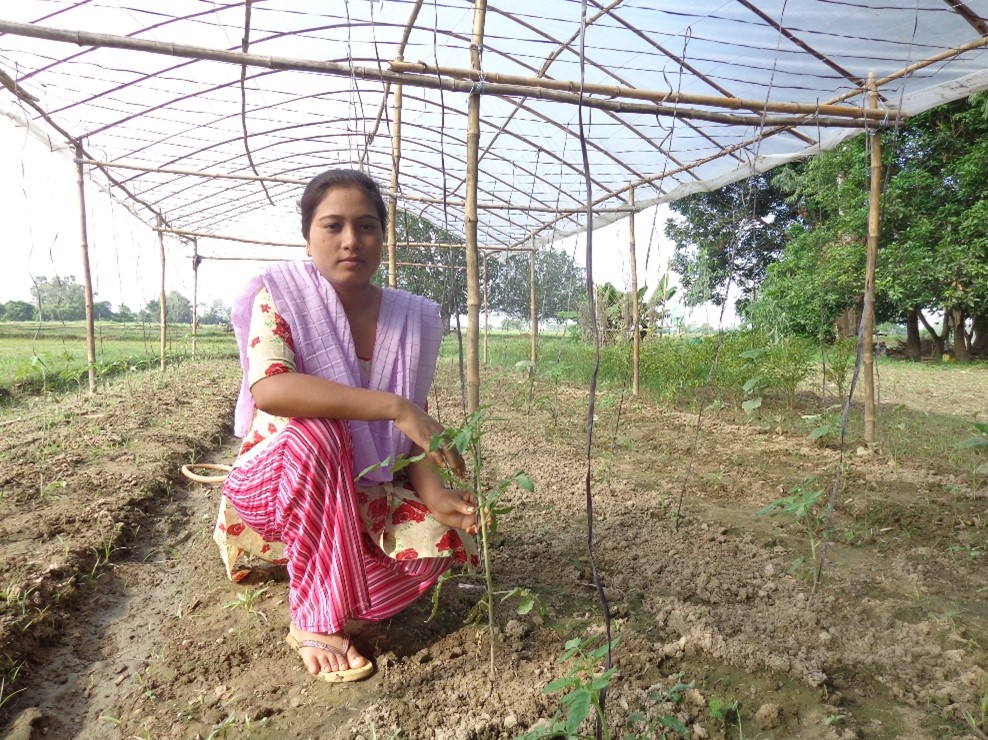
International Youth Day
International Youth Day occurs every year on August 12th. It’s a valuable chance created by the UN to focus on the biggest issues facing young people throughout the world. The theme in 2021 is “Transforming Food Systems: Youth Innovation for Human and Planetary Health.” As the world population grows and nations respond to climate change, sustainable food systems will become more important than ever. To achieve the necessary changes, the participation of young people is critical!
This International Youth Day is a great opportunity to share some of the earliest success stories from NYF’s new SAAET Project!
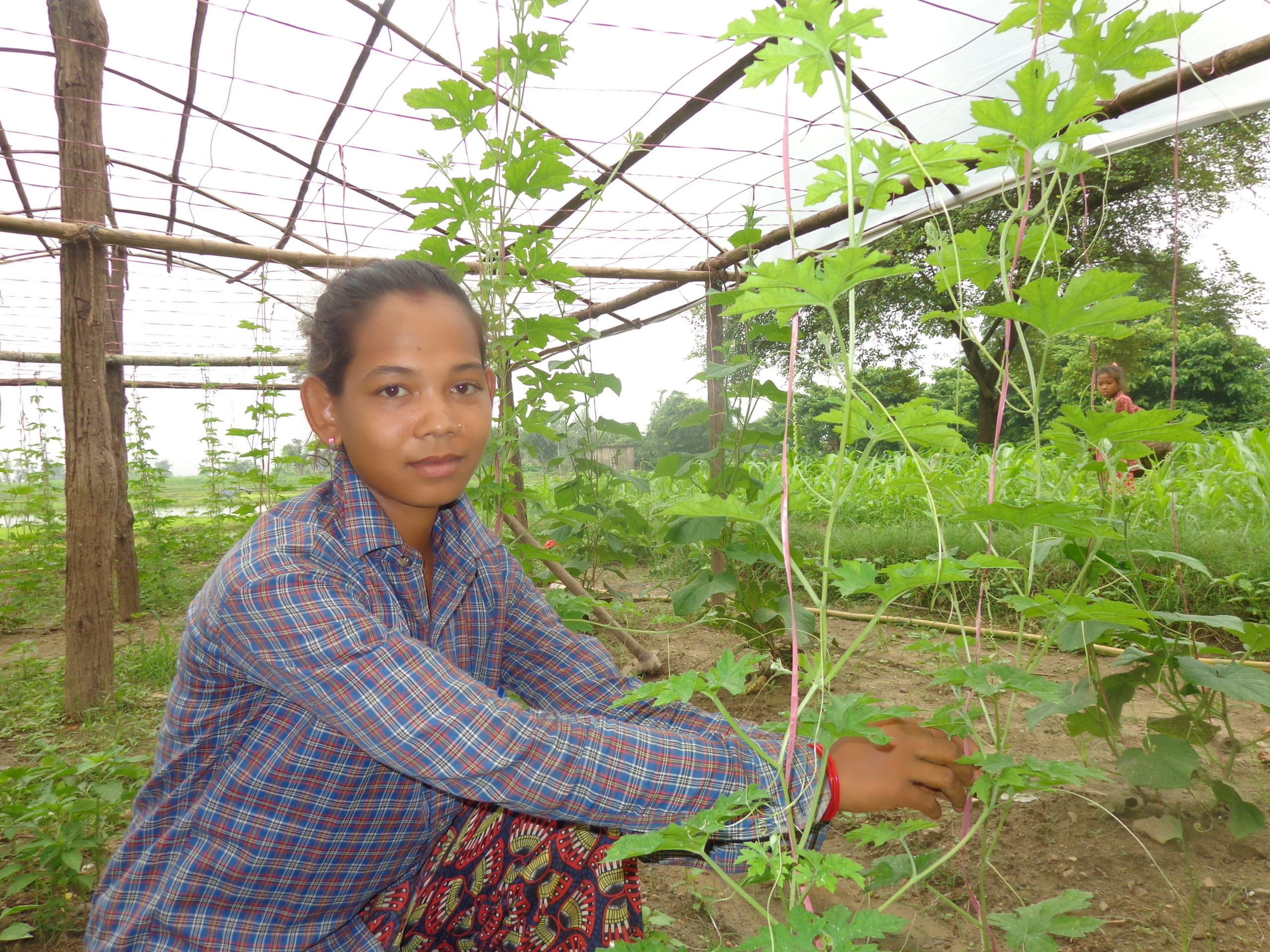
The SAAET Project
Saaet is Nepali for “an auspicious moment of starting a new journey” – and at NYF, it stands for Sustainable Agricultural and Entrepreneur Training.
This project tackles gender inequality, skills development, and food systems all at once. Designed especially with young women in mind, this course brings simplified greenhouse technology and up-to-date organic agricultural practices to individuals hoping to achieve financial success while staying within their home communities.
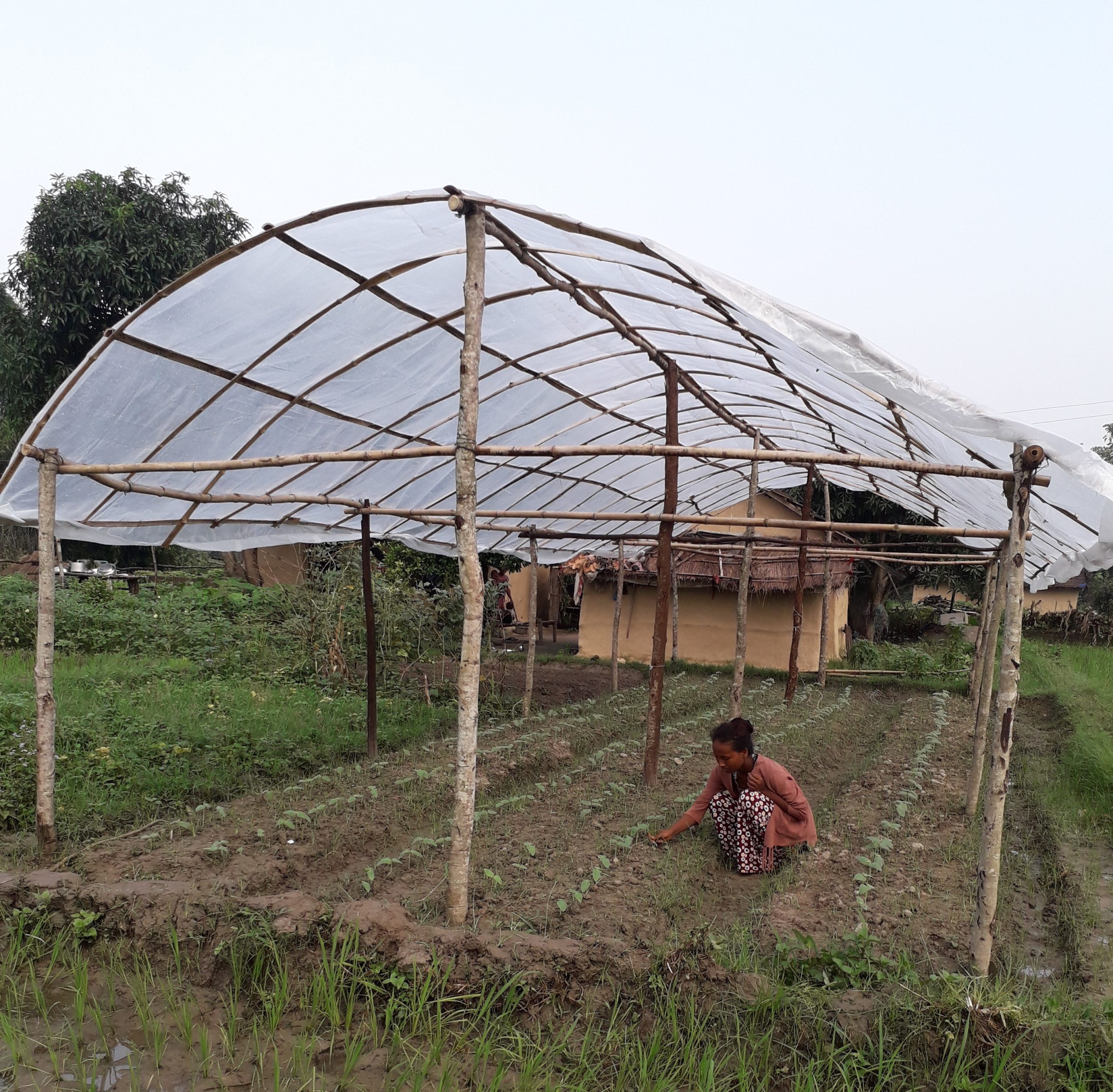
NYF’s Vocational Education and Career Counseling Program (VECC) offers multiple job readiness and vocational education options to Nepalese young people seeking career opportunities close to home. Those we help are experiencing many different kinds of barriers to economic success—but those most in need are usually young women.
The SAAET Project is just one part of NYF’s work to combat child marriage in Nepal, and part of our commitment to helping young women and girls find economic empowerment on their own terms.
Our first class of SAAET students were Freed Kamlaris from the Western Terai. Their training took place in March-April 2021—let’s see how they’re doing!
Sunita T.
When Sunita was only 13 years old, her father sent her to work as a kamlari far away from her home in Bardiya District. In exchange for her labor, the family was promised two things: they would be allowed a large enough plot of leased land to feed the family year-round, and Sunita would be sent to school.
As so often happened, the family broke their promise about Sunita’s education. She worked as a kamlari for 5 years, until she was 18 years old. NYF knew about her situation from surveys conducted in the village, and we had to threaten legal action to finally bring her home.
Sunita is 26 years old now, and the memories of her days as a kamlari are still fresh and painful.
She worked extremely long hours, from early in the morning to very late at night, locked in the house doing cooking, cleaning, childcare, and any other work that came up. Sunita hopes no child ever has to suffer that way again.
Once rescued, Sunita enrolled in grade 6 and managed to complete her studies through grade 10. In Nepal, all students must take the notorious “Iron Gate” exam (the Secondary Education Examination) at the end of grade 10. This extremely rigorous test determines who can move forward. Sunita was unable to pass the Iron Gate, so her academic studies ended there.
She got married in her early 20s and, through NYF support, took an 18-month vocational course in agriculture. Sunita and her husband decided they preferred the idea of farming over the notion of working for someone else, so they applied for a microloan from their local co-operative and started banana farming. Soon they added vegetables, chickens, and pigs. Sunita and her husband have been happy to be able to pay back the co-operative loan, and they’re paying the lease on their land through their own earnings now.
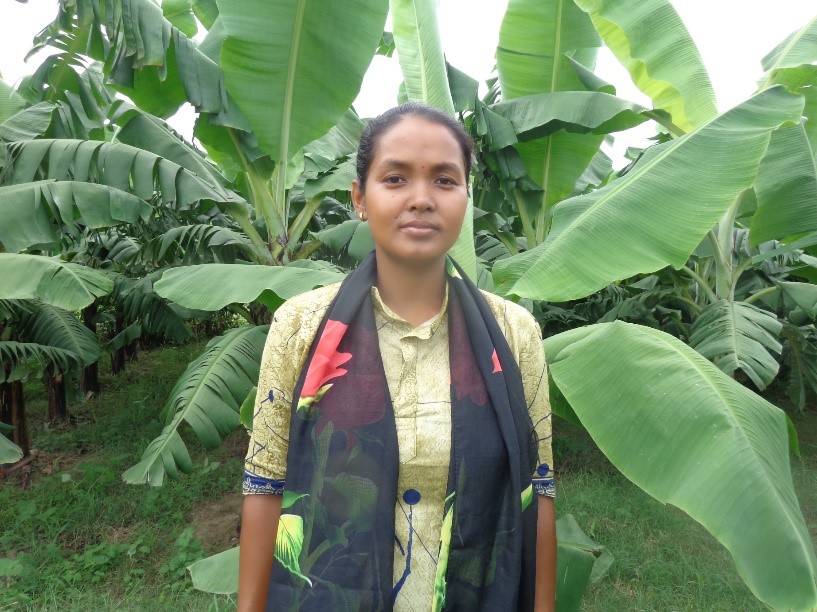
But Sunita hopes to be able to own the land outright and expand the business further.
That’s why she was so happy to join the first class of the SAAET Project. The material taught in the class expanded Sunita’s existing knowledge of best agricultural practices and gave her great new ideas for her farm. She also learned helpful business practices!
When she returned home, the spring COVID outbreak was just hitting the Western Terai, and shutdowns made accessing building materials more difficult than expected. But Sunita was still able to start working on her own new greenhouse, which will allow her even more crop flexibility. She is already harvesting her first greenhouse crops, and she’s looking forward to being able to continue growing vegetables through the winter months. Sunita and her husband are hoping their farm will become a model for other farmers in the region.
“Dhanyabad, NYF!” she says. “I am very grateful for the invaluable support I have received from NYF which has transformed my life beyond my imagination.”
Lila C.
When Lila was born, her entire family was bonded in a practice called Kamaiya. Nepal abolished the Kamaiya system in 2000, freeing the family from this exploitative practice. But without much government support for families like Lila’s, they soon needed access to farmland they could only get by making Lila a kamlari for their landlord. (Kamlari was the last remaining piece of the old Kamaiya system.)
“My landlords did not send me to school, but I missed going to school badly. I was studying in grade 4 when I had to become a kamlari,” Lila says. “I had to sacrifice my education just for my family to be able to get two decent meals a day. There was no way the landlord would give us the land for farming if I refused to work.” Lila was ten years old and carrying the threat of her whole family’s starvation on her shoulders.
As a kamlari, “I had to do all the work from cooking, cleaning and looking after the landlord’s children, to cutting and collecting fodder for the cattle,” she recalls. “If I was ever late to come home or late for work, I would be scolded badly.”
One year into her time in bondage, Lila learned about an anti-kamlari campaign in her village. “I feel so lucky that I did not have to work as a kamlari as long as so many of my friends did,” Lila says. NYF had been collecting the names of known kamlari girls, and Lila’s name had appeared on these lists. “I was worried I wouldn’t be able to go to school after returning home, but on the day of my rescue, I heard that the same organization would be sending me to school, too. I felt so happy. And I suddenly felt so relieved and light at heart because I would not have to bear the anger and scolding from the landlords anymore.”
Lila studied all the way through 12th grade and then completed an 18-month agricultural science course on an NYF scholarship.
She and several other freed girls established their local co-operative to help their community grow its economic power, and Lila helped her family start up a vegetable farm that could feed them year-round and even bring in up to $60 a month.
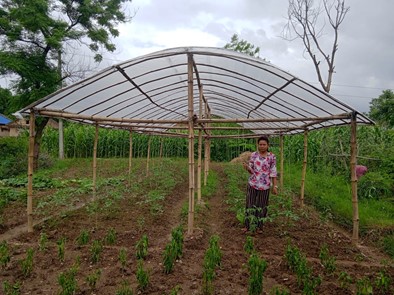
Lila got her greenhouse started right away when she returned home from the SAAET training. Her family is already seeing the benefits of the program on their diet and on their ability to bring in extra cash! She is looking forward to adding in the drip irrigation system soon, and is planning her strategies for fall and winter crops.
Now, at age 26, Lila knew she needed a bit more specialized knowledge to take the family farm from subsistence agriculture to a fully-fledged business. She was thrilled to hear about the SAAET Project.
“During the training I learnt about increasing production by growing vegetables throughout the year using more efficient tools and techniques,” she explains. “I also learnt about organic farming and producing organic pesticides by myself. NYF not only provided the skills but also a start-up fund for us to build a greenhouse. With the money and the skills, I and my family have built a greenhouse near our house and have already started vegetable farming. I am confident that we can produce far more than before and increase our income. Gradually we plan to expand greenhouse farming and establish a successful business.”
Arati T.
Arati was ten years old when her father sold her off as a kamlari in a different village. “Even now, I always get sad and wonder what made my father to sell me as a kamlari,” Arati says. “I try and console myself that it was not entirely his fault alone, and that he was a victim of the oppression and the ill practice of slavery of the Tharu people.”
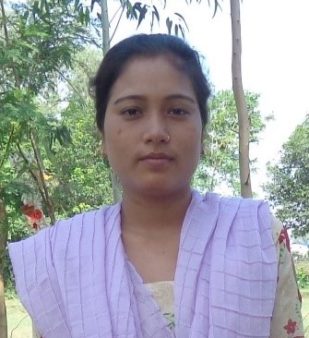
Memories of her kamlari years are painful and difficult for Arati.
“My parents had sent me as a kamlari on the condition that I should be sent to school. The landlords therefore admitted me in school, but I was able to go to school only after finishing all the work at home. I had to wake up in the dark hours before four o’clock in the morning and start my chores. I looked after the landlord’s children, cooked, cleaned, did the dishes, and all the other chores around the home. The landlords would get very angry if I made any mistake and scolded me constantly.” Arati takes some faint consolation in the fact that her landlords did not beat her.
“I was desperately looking for a release from this condition,” Arati recalls. “I wanted to be free like other children and go to school like them.”
After three years, a massive anti-kamlari campaign took hold in Arati’s village and NYF rescued her from bondage by NYF. “I felt very lucky that I got this life changing opportunity,” she says, “and I pursued my studies seriously.”
Arati recently completed the 12th grade. During her studies, she was part of a group of freed girls who established a local co-operative for savings and credit. She’s a proud contributing member of this co-op.
Back in 2018, Arati and her family acquired a plot of land to start a vegetable farm—but they have not managed to run it in a systematic, commercial manner. Arati signed up right away when she heard about the SAAET Project, knowing the training would make a huge difference.

“During the training we (21 girls including me) learnt a lot about using more advanced tools and technology for greenhouse farming, and about adopting agriculture as an income-generating enterprise.
After I returned home from training, I have built a greenhouse and started vegetable farming with the help of my family. I now have the knowledge about both seasonal and off-season farming, which will enable us to produce vegetables throughout the year. I am confident that by using the knowledge and skill I acquired from the training, we can easily increase the production and income by as much as three times than what we are able to do now. My parents are also very happy and proud of me and the work we are doing as a family.”
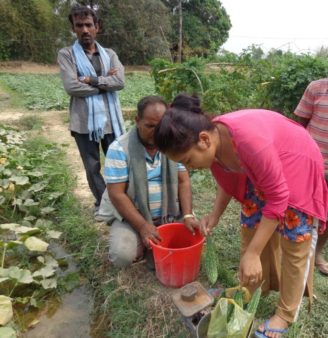
Those in Arati’s village are already spreading the word that she has vegetables to sell! Her farm, and others like it, will make an enormous difference in the health of the surrounding communities.
Only the Beginning
The SAAET Project has developed organically as NYF has responded to the pandemic—and we are enthusiastic about developing it further. This International Youth Day, we are so proud to be helping communities of young people pull their communities forward using new innovations and skills.
As Nepal’s economy heals from the COVID-19 pandemic’s impacts, young people in Nepal will need job preparedness training and career education more than ever.
To help us continue offering the SAAET Project and other vocational training programs, please donate today, and share our message on social media!
(For an even greater future impact, consider celebrating National Make a Will Month throughout August 2021 by joining our Legacy Circle!)
Frontline Warrior: NYF’s Lila Tharu Celebrates Freedom Day by Saving Lives
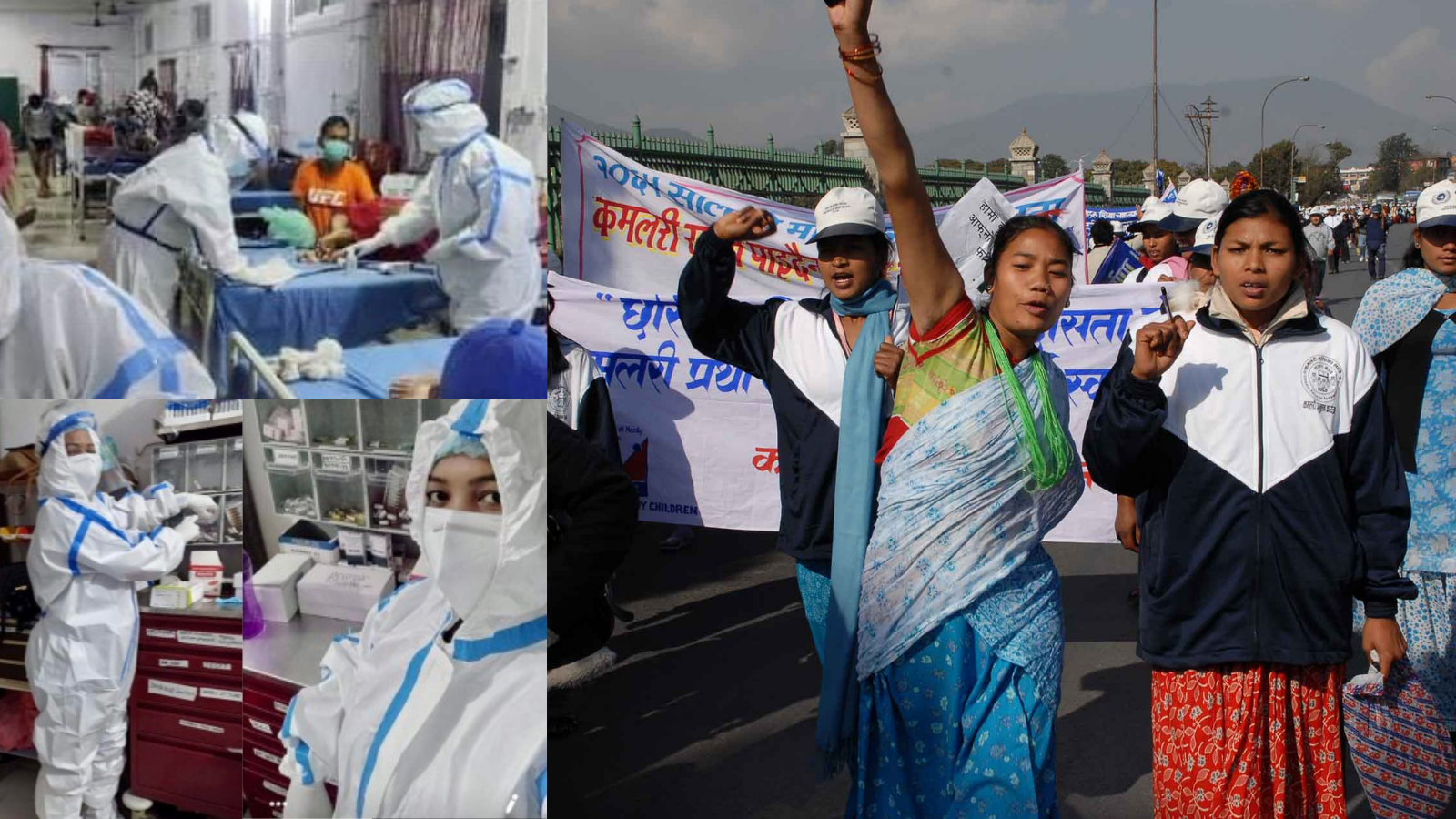
Frontline warrior healthcare workers across the world have spent nearly 18 months battling COVID-19 to defend their communities. These heroes have saved countless lives during the pandemic.
For one of these warriors, Lila Tharu, age 26 (below), her status as a nurse and midwife is a source of particular satisfaction. NYF is proud to count Lila among our many accomplished alumni now to heal their communities during this crisis.
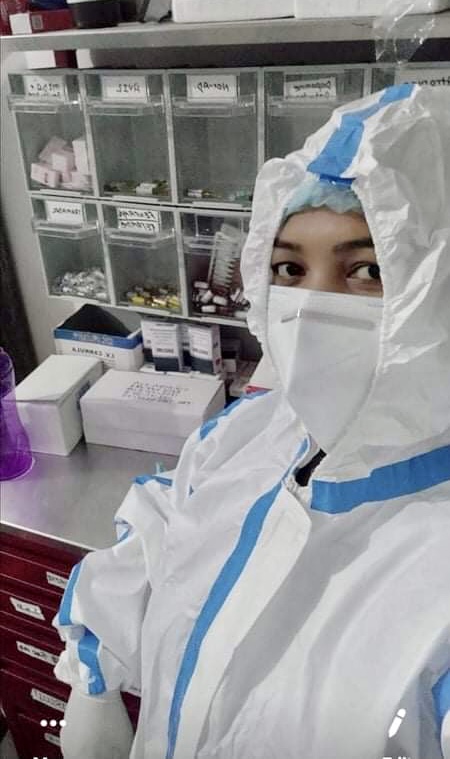
Kamlari Freedom Day
June 27th, 2021 marks the 8th anniversary of the legal abolition of the kamlari practice in Nepal—otherwise known as Kamlari Freedom Day.
Kamlari was a form of indentured servitude which exploited the daughters of the Tharu ethnic minority group in Western Nepal’s Terai region. After generations of predatory lending by more powerful “land-owning” groups, the practice emerged as the only way for families to pay back exorbitant generational debts.
At every Tharu New Year, parents sold their daughters—some as young as six years old—to work long hours in the homes of strangers. In return, families would receive an average of only $30 for an entire year of their child’s labor. Thousands of Tharu girls spent their entire childhoods in kitchen slavery. Some never returned home.
To people in the Western Terai, the kamlari practice had come to seem inevitable. It was a baked-in cultural truth that very few people dared to question.
Lila Tharu – Kamlari Life, Rescue & Education
Lila was born in Thakurbaba Municipality in Bardiya District. When she was 12, Lila was sent away to work as a kamlari in 2005. Her two older sisters had also worked as kamlaris.
After two years working in her master’s house and being denied an education, Lila was identified and rescued by Nepal Youth Foundation in 2007. Through the Indentured Daughters program, her family was provided with economic support to offset Lila’s lost “wage.” It also included the materials needed to allow Lila to return to school: a kerosene lamp to study by, a school uniform, notebooks, and more.
Lila was a determined student who dreamed of becoming a midwife. Soon after her rescue, she enrolled in grade 7 at a local school. She completed high school (10th grade at the time in Nepal) in 2012, passing her country’s notorious SLC “Iron Gate” exam. Lila earned a place in the Auxiliary Nurse Midwife program at Sushma Koirala Memorial Institute in Nepalgunj. NYF provided her with a college scholarship throughout her studies.
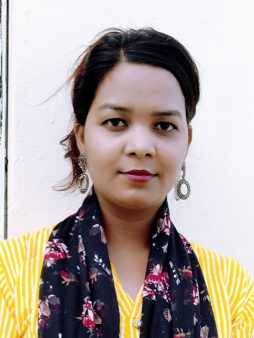
NYF continued to provide career support as Lila began her nursing career in a private hospital in Banke District. And in November 2016, she finally landed her dream job as an Auxiliary Nurse Midwife at Bheri Hospital in Nepalgunj, the largest government hospital in the region. She has remained there ever since, continuing her education by taking Nursing Care and Skilled Birth Attendant trainings to further enhance her skills.
The salary she brings home each month is far beyond what members of the Tharu community thought possible for one of their daughters only 10 to 20 years ago. Not only is Lila serving a critical role in her community’s health system—she is proving the incredible potential within a Tharu girl.
Lila Tharu – Frontline Warrior
At the beginning of 2020, Lila was living at home with her mother while continuing her career. Lila’s father had passed away years before, and her two sisters were now married.
Things changed in Lila’s work life when the pandemic hit. She was added to a special COVID treatment team early on and assigned temporarily to nearby Sushil Koirala Cancer Hospital in Khajura. This hospital had been set aside especially for COVID patients. Lila worked there for several weeks during the pandemic’s first wave. She also served COVID patients in mandated isolation in a Kalpatri hotel during this time.
Now, during Nepal’s intense second COVID wave, Lila’s hospital in Nepalgunj is at the epicenter of the crisis. Many young people from Western Nepal cross the border into India to find work. When the virus surged in India earlier this year, they fled back north to escape the pandemic—not realizing they were bringing the virus home with them.
Bheri Hospital now has four dedicated COVID wards. Lila (below, in white at far right), who has valuable COVID Care experience from 2020, is a frontline warrior in one of them.
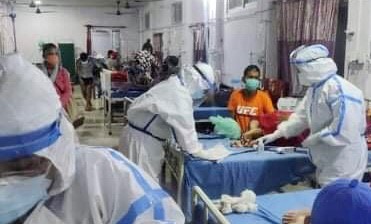
She is hard at work monitoring her patients’ vital signs, measuring oxygen levels, and providing intravenous therapy and medicine, as well as other critical care. COVID death rates for hospitalized patients are frighteningly high everywhere, and Lila’s ward is no different. During this second surge, they have lost an average of 3-4 patients per day. But Lila tries to remember the lives she has helped to save as well. Many of her surviving patients would not be able to return home if not for her.
In spite of rigorous safety protocols, Lila herself caught COVID in the spring, like many other frontline warriors across the world. Fortunately, her symptoms were mild. After a short isolation, she returned courageously to the COVID ward to continue her lifesaving work.
She will continue this work until her expertise is no longer required in the COVID ward. She (below, preparing medicines for a patient) is proud to be doing this important work in her community—and grateful to the NYF Community for making her journey possible.
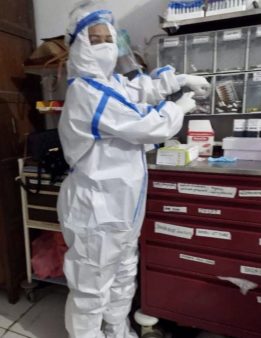
Just One Story of Thousands
Lila says she was afraid when the virus first arrived in Nepal. But now, she is extremely dedicated to the community she serves. Her courage is nothing new to NYF.
Like the other Freed Kamlari women, Lila had already experienced intense hardship and taken many daring steps before COVID arrived. Together, while most of them were still children, these girls dared to challenge their communities, abandon their masters, question their culture, and declare their own worth. Many of them returned home to families who resented them for taking such bold steps. Others were injured while marching for kamlari freedom, as police objected to the girls’ protests against the government.
Lila is one of thousands of Freed Kamlari who refused to stop simply at being rescued from an exploitative practice.
She and so many others have claimed their personal power by seizing educational opportunities and chasing their dreams – and working to lift their sisters and daughters in the process. Some are becoming lawyers, determined to defend human rights. Others have become small business owners or specialized farmers, gradually building personal and generational wealth in ways their parents could not.
And some, like Lila Tharu, dreamed of helping others in the healthcare field. They’ve grown up to be frontline warriors in a global crisis they never imagined.
Happy Kamlari Freedom Day, Lila!
Happy Freedom Day to ALL of the Freed Kamlaris
and to the young girls and women who will never be bonded away!
And Happy Freedom Day to the NYF Community—to everyone who helped support this incredible program. Lila’s story, and so many others like it, are proof of the amazing way your #LoveWorks.
Celebrate with NYF today.
To help celebrate this joyous occasion and support the education of brave young women like Lila, please make a thoughtful gift for NYF Scholarships or our Vocational Education program on our donation page. Additionally, join the NYF Community by signing up to receive emails here.
SAAET Project: Lockdown inspires new growth for young women in Nepal
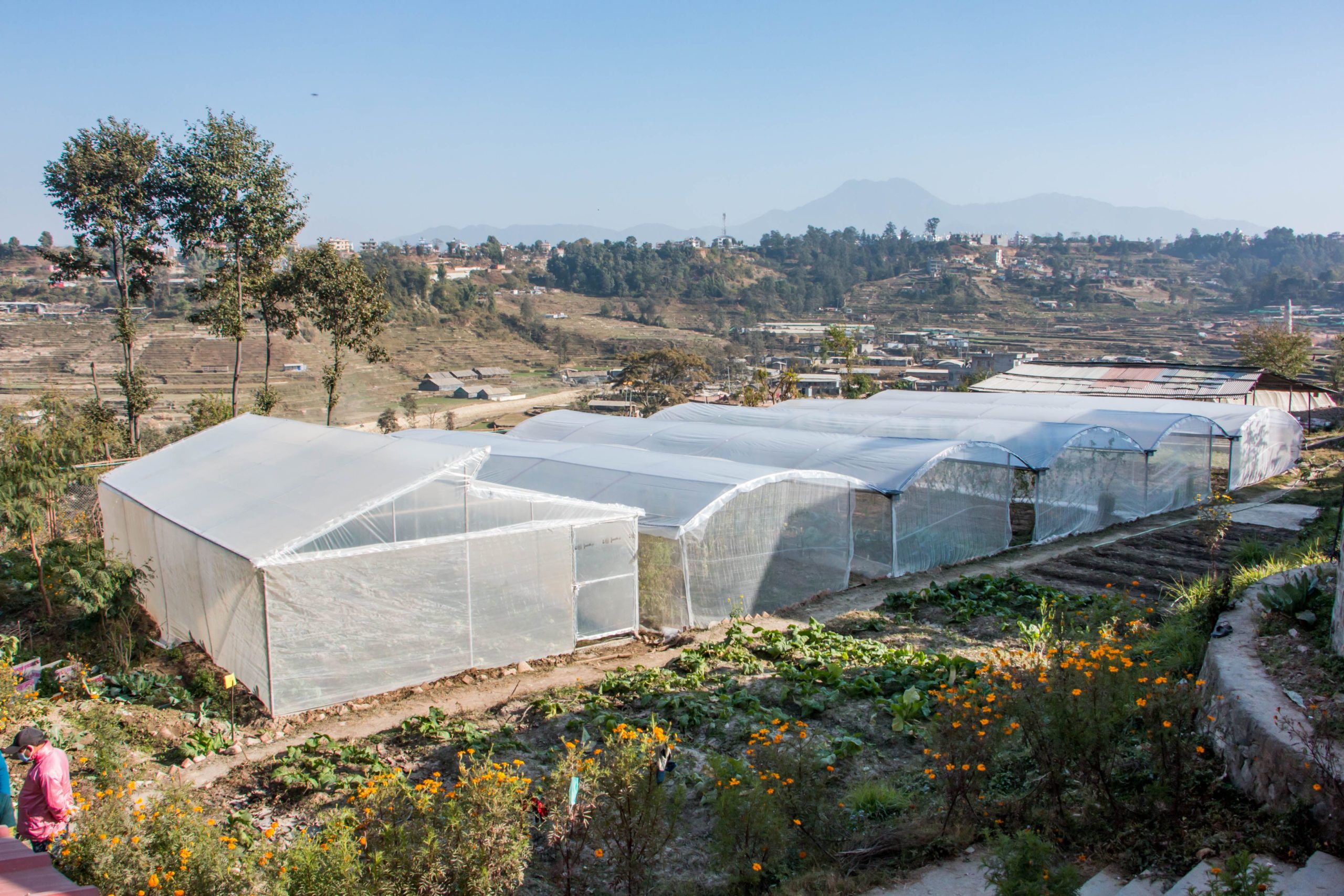
A letter from President Som Paneru
Dear NYF friends and family,
One year ago, just before the pandemic began, NYF was working to engage more women in our vocational education programs. We had seen that most of the young people interested in coming to Olgapuri Vocational School were young men—no matter how hard we tried to encourage young women to apply.
We reached out to families and learned that many young women were anxious about living near a big city like Kathmandu. Others insisted that even if they learned the skills offered—carpentry, plumbing, welding, and electrical—the pervasive culture of workplace sexism in Nepal would ensure they never truly advanced in a career. To these young women, the risks associated with these career goals were simply too great. As we worked to design an enriched program especially for them, the pandemic arrived. Olgapuri Vocational School was forced to shut its doors until further notice.
That is when the pandemic forced us to look at the problem differently.
During the lockdown, a generous donor helped us begin building a beautiful group of greenhouses on the Olgapuri grounds. As I oversaw the progress, I wondered—could we design a pandemic-safe vocational education program for young women that could bring greenhouse technology and training to their villages?
Greenhouses are relatively inexpensive to build and maintain, and can provide an enormous economic benefit to women in rural communities.
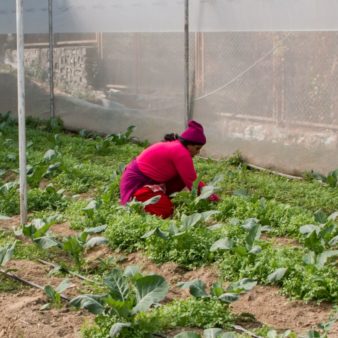
This is how the new SAAET Project was born. Saaet means “an auspicious moment of starting a new journey” – and it stands for Sustainable Agricultural and Entrepreneur Training.
Starting this spring, our greenhouse trainer will travel to rural villages to quarantine and then provide hands-on training to classes of 20 young women each. Students will learn the basics of organic farming, nursery techniques, construction and use of plastic greenhouse and drip irrigation, budgeting, bookkeeping, and more. By the end of the training, each woman will be prepared to manage her own greenhouse—feeding herself and her family with nutrient-rich vegetables, and often making extra income, even during a crisis.
Including the start-up materials for each girl’s fully-functional greenhouse, the project’s cost per village is $7,500. In our first year, we hope to bring the SAAET Project to five villages—or 100 young female entrepreneurs.
I am so grateful for the loving support that has made this project possible during an unprecedented crisis. Your gifts are helping Nepalese young people build towards better health and brighter futures.
Dhanyabad,

Som Paneru
President